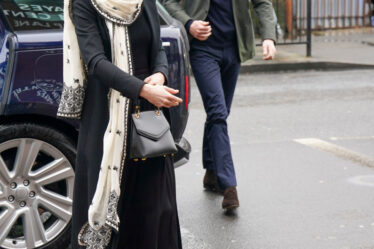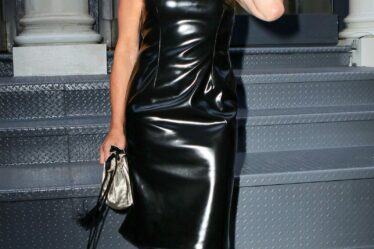Beyoncé took control.
Earlier this week, the singer-songwriter-actress-designer-founder gave her naysayers something to talk about when she posted an elaborate hair tutorial, complete with voice over, using her newly launched Cécred products. In the video, Beyonce is seen getting her hair washed and styled by her longtime hairdresser Neal Farinah, while offering tips to onlookers, like how she dries her hair on medium heat to avoid damage. She also directly addresses questions of the authenticity of her hair.
“The stigma and misconception is that people that wear wigs don’t have long and healthy hair. That’s some bullshit cause it ain’t nobody’s business,” she said.
When Cécred debuted in March, Beyoncé received flack for being yet another celebrity to launch a beauty venture. (Since last year, she not only introduced her new hair care line, but she also announced her first fragrance, Cé Noir, in a decade.) Many wondered why Beyoncé was starting a hair care line at all; others asked for a wig or weave line from the singer, given her use of them at performances and appearances.
This week’s video, which now has over 2.37 million likes on Instagram, was clearly an attempt to show off her natural hair and that she indeed uses and needs her own products.
The gambit didn’t entirely quell criticism, but it did steer the discourse in some new, friendlier directions. The sentiment across online discussions varied widely, with some suggesting that dissenters should feel remorse for effectively pressuring Beyonce into sharing a hair tutorial. One post from an anonymous user that was shared on Instagram Stories by The Black Beauty Club read, “The haters need to admit their wrong doing and let the devil be ashamed.” On Black culture site The Shade Room, the ridicule and distrust for Beyoncé was persistent if not ferocious: “That’s a bomb ass full lace 360 wig. Y’all wild. And will believe anything,” said hairstylist Tamara Tripp.
Despite what people are debating online, the social chatter doesn’t necessarily reflect what the target Cécred customer is thinking … but it can influence it.
While Cécred isn’t only for Black consumers — it prominently features women and men of multiple ethnicities on its website and social platforms — it does include products for coily and curly textured hair. However, it appears that it is these Black shoppers who are the most sceptical of the brand.
“The video might drive purchases, but Black people remain incredulous about the authenticity of Beyonce’s beauty … and that might be a hindrance,” said my colleague and The Business of Fashion DTC correspondent Malique Morris, who happens to be a huge fan.
Sheena Butler-Young, our fellow coworker and BoF’s senior correspondent that covers workplace and talent, added that the “the public isn’t fair to Black women and is far too critical.”
While plenty of celebrities have entered the textured hair care space, including Gabrielle Union, Taraji P. Henson and Tia Mowry, only Tracee Ellis Ross seems to have the authenticity that certain shoppers are after — and Ross has been proudly touting her natural hair since her days on “Girlfriends.”
Personally, I thought Beyoncé accomplished what she needed to – she put herself, a very known and familiar face, in an unfamiliar situation. From a marketing perspective, it felt nearly as compelling as Jeremy Allen White’s recent turn for Calvin Klein. And as a budding beauty entrepreneur, the tutorial was necessary.
Given the glut of celebrity labels, the ones that standout – Rihanna’s Fenty, Selena Gomez’s Rare Beauty and now increasingly, Hailey Bieber’s Rhode — are those that engage with consumers, and start and insert themselves into existing trends and conversations. (The question of whether Beyoncé’s hair is her own is certainly a talking point that has plagued the singer for years.)
One thing is certain, brands that have faded into obscurity often share two common traits: their founders aren’t deeply connected to their brand or fail to maintain a consistent dialogue about it. Despite the undeniable beauty of stars like The Outset’s Scarlett Johansson and Jennifer Lopez of J.Lo Beauty, their absence from ongoing beauty dialogue and their lack of a prominent role as brand founders are striking when compared to their contemporaries.
It remains to be seen where Beyoncé will land on this spectrum.
Here are my top picks from our insight and analysis on beauty and wellness this week:
1. Beauty E-Commerce Is Broken

Once thought of as long-term disruptors who would change the way we shop forever, multi-brand online retailers that sell cosmetics, skincare and fragrance are facing multiple headwinds.
2. Luxury Brands Stumble In Their Race to Conquer Beauty

Prestige makeup is fashion’s category expansion du jour. But even the market’s most powerful players could learn a thing or two from its celebrity-backed competition.
3. The Opportunity in Private Label Beauty

By selling existing formulas under their own name, retailers can tap into the lucrative beauty market without investing in custom formulations. But that doesn’t mean the private label model is an easy win.
THE BUSINESS OF BEAUTY NEWS IN BRIEF
TikTok’s crackdown on Ozempic influencers threatens the weight-loss drug hype machine. The social media platform will effectively ban most weight loss-related content from appearing on its app starting next month, According to the new rules, the app will no longer allow the marketing of weight-loss products and will specifically restrict minors from viewing or sharing content that shows, describes “potentially harmful” weight management behaviours
Unilever India is losing foreign shareholders on high valuations. Foreign funds reduced their ownership of India’s largest staples company to 12.7 percent at the end of March, down from as high as 14.5 percent in June last year. The firm’s shares have slumped more than 9 percent in the past 12 months.
Galderma sales top $1 billion. Within the injectables category were $263 million, up 20.4 percent, while fillers and biostimulators were $248 million, up 18.2 percent. Dermatological skincare sales were $351 million, with global expansion in Asia, as well as marketing efforts tied to New York Fashion Week and the Super Bowl.
Playground closes $2 million in funding round. This marks the brand’s first institutional raise since its founding in 2023. The company will use the funding to expand their retail network and the brand launches in Target this month.
PZ Cussons to sell St. Tropez. The fake tan brand could be worth £100 million, Investec analyst Matthew Webb said in a note. The company also put its Africa business under review, potentially pivoting away from the region in which it was founded to invest in its remaining business and pay down debt.
Unilever sales rise more than expected. The consumer goods group said sales rose 4.4 percent in the first three months of the year, ahead of analyst expectations of 3.5 percent. Shares of Unilever rose as much as 5 percent in early trading in London. The stock is down more than 9 percent in the past year.
Celine adds to fragrance line-up. Beyond extending into cosmetics, Celine is adding to its fragrance assortment with Zouzou priced at $280. Its name is derived for the affectionate term used for young girls with short hair, or also to convey fondness.


